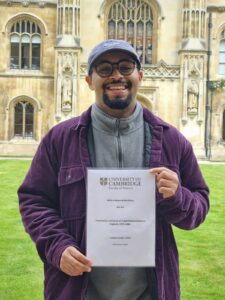Welcome to the EBS Modern Foreign Languages Faculty! We hope to provide you with all the information you need about this faculty, but if you need any further information, please do not hesitate to contact us.
“Languages make exploring the unfamiliar an exciting rather than nerve-wracking prospect, something which I think can help us all, particularly in today’s world.”
Lily Rachel, former EBS student, now studying Spanish at Oxford University
At East Barnet School we aim to instil in students a love of language-learning and communicating by providing them with a broad and ambitious Modern Languages curriculum which gives students the skills and knowledge to fulfil their linguistic potential, as well as increasing their awareness and understanding of language and culture, both their own and those of others.
Our KS5 students leave having made significant progress towards becoming fluent and spontaneous speakers of the language. Throughout their time at East Barnet, students develop their ability to describe themselves and the world around them, to express a range of opinions and to use their language in realistic situations, while our curriculum gives students the opportunity to use their language skills, both productively and receptively, to communicate on a range of topics of increasing complexity.
Languages are often perceived to be a difficult subject, but we believe that a correctly differentiated curriculum can help all students to make excellent progress and to develop their linguistic competence. We encourage students to work collaboratively and to support each other in this.
In addition, the study of a foreign language benefits students in other ways. They become more confident and effective communicators in English and they develop their resilience and perseverance. Languages help students to become more analytical through spotting patterns and applying grammatical rules. Even if students never visit the target language countries and use their language practically, they benefit from their experiences of our MFL curriculum.
“The language we use every day is what helps us create the worlds around us. Your words build worlds! We can adapt, change and build on the language we use in order to change the world for the better.”
Jodie Hare, former EBS student, now working as an author and translator
For more information on Careers, please visit our Careers & Alumni page.
Whether you are looking for some subject specific resources, past papers, apps to keep you motivated, tips from EBS staff, or just a weekly revision planner, we have got you covered! Click the button below and check it out!
J. Giffen
Head of Faculty
350 (3rd Floor)
enquiries@eastbarnetschool.com
020 8344 2100
If you require any further information about the curriculum we are following in this subject, please contact the Head of Faculty.








We asked some former EBS students who studied a language whilst they were here, what they have gone on to do with the qualification. It is really interesting to see the EBS spirit going out into the world!
 Elliott left EBS in 2017 having got a B in his German A-Level.
Elliott left EBS in 2017 having got a B in his German A-Level.
What course did you study at university and how did you find it?
I studied Modern Languages (German and Korean) at the University of Central Lancashire (UCLan). I found the course really interesting and it was great to be able to explore the language and culture in various ways. I was a little worried to study Korean ab-initio (from scratch), but the pace was manageable and I really enjoyed it. The photo shows me at Chungang University in Seoul, South Korea where I did my year abroad.
How do you think that your languages will be useful for you later in life?
I think my languages will be useful later in life for when I move to live and work in Korea in the future. In hindsight, it might have been more useful to study a different course such as TESOL and Korean because it would be more useful for what I want to do now (teaching English in Korea). On the other hand, a great thing about studying languages at university is that it can lead to so many different career paths, so you don’t need to have everything planned out before you go to university.
What benefits are there in studying languages at university?
There are many benefits to studying languages at university. The optional year abroad is definitely a once-in-a-lifetime opportunity to be able to study or work in a foreign country as part of your course. There are lots of cultural events and trips which take place alongside the course. In addition to language modules, you can choose to study modules you are interested in, such as literature, translation, linguistics, etc.
Why do you think languages are important?
I think languages are important because not only do they allow us to go to different places and talk to different people, but they enable us to see the world from different perspectives.
What advice would you give to a GCSE student who is considering taking a language A-Level?
My advice for students considering taking a language at A-Level would be to enjoy it and not be afraid to ask questions or make mistakes. If you find some TV shows, films or music that you enjoy, it will help motivate you to learn the language – I remember Miss Wolf used to bring in different German DVDs for us to bring home and watch. If you study German you can check out Fack ju Göhte or Keinohrhasen.
 Steph finished her German A-Level back in 2009. Here is what she has to say about the importance of languages:
Steph finished her German A-Level back in 2009. Here is what she has to say about the importance of languages:
I didn’t go to university after finishing A-Levels and college; instead I got straight into working. I now work as Photography, Videography and Media Executive for the travel company TUI (Formally Thompson). Part of my job (although not recently due to the current situation) involves travelling to the countries where we offer excursions and capturing imagery of the experiences on offer! This is my dream job! It had honestly been a while since I had practised any German, but I soon picked some things up again when I was photographing on a German excursion with a German only speaking guide. This definitely tested my language skills. My most used phrase to begin with was “Ich spreche ein bisschen Deutsch, aber ich verstehe mehr als ich spreche” (I speak a little German, but I understand more than I speak). But once I got into the swing of things, I managed to have more of a conversation with some of the guests, which they really appreciated and enjoyed. A work trip to a photography convention in Cologne, Germany a few years ago was another reason I appreciated taking A-level German. I was able to navigate the U-Bahn, order food and drinks, ask for directions and enjoy myself much more, all without having to dig my phone out and use a translation app. I have also recently been seconded to work with the recruitment social media team where we get comments and questions in all languages. Although we answer in English, as it is the company’s main language, it has been nice to understand what the German followers have been asking without relying on Google translate too much. I fully intend to pick up German again to practise and remember what I have learnt, so I can be confident and hold much more in depth, grammatically correct conversations
 Languages are so important to learn; although widely used and spoken English is not the only language spoken in the world. It is lovely to travel and is very much appreciated when you use the native language. Working in the travel industry, having a second language or language skills on your CV definitely opens up more job opportunities for you. Some advice – don’t give up. It was a big jump from GCSE to A-Level German and learning the grammar on top of the vocabulary was difficult at times, but challenge is always good and it’s definitely worth it! Plus, Mr Giffen was an awesome teacher, that alone should make you want to take German! 😉
Languages are so important to learn; although widely used and spoken English is not the only language spoken in the world. It is lovely to travel and is very much appreciated when you use the native language. Working in the travel industry, having a second language or language skills on your CV definitely opens up more job opportunities for you. Some advice – don’t give up. It was a big jump from GCSE to A-Level German and learning the grammar on top of the vocabulary was difficult at times, but challenge is always good and it’s definitely worth it! Plus, Mr Giffen was an awesome teacher, that alone should make you want to take German! 😉
 Andrew left East Barnet in 2017 having got grade A in French and A*in Spanish.
Andrew left East Barnet in 2017 having got grade A in French and A*in Spanish.
What course did you study at university and how did you find it?
I studied French and Spanish (with a year abroad) at King’s College London. Reflecting on my experience, I can honestly say that I learned so much; my knowledge of French and Spanish flourished as well as my confidence in using them to communicate with native speakers and academics at the university. Although challenging at times due to the workload (just like any other degree), studying languages at university level truly opened my eyes to the importance of communication and the beautiful French and Spanish cultures that deserve to be studied. At university level, I was able to deepen my understanding of French, Spanish, and even Catalan grammar, literature, history, politics, translation, and so much more.
Do you use your languages in your daily life or for your work? If so, in what way?
Frankly speaking, I constantly use my English, French, Spanish, Catalan and Greek without always realising! Every time I watch a movie or read an article in any language I can speak, I automatically think about possible translations, which shows how languages have positively influenced my daily life. I also use languages in my part-time job, since I am faced with people from various different backgrounds whose English is not always particularly great. In short, if you are a linguist, you spend much of your time thinking in the languages you speak, both consciously and subconsciously. Languages are applicable to everyday life!
Why do you think languages are important?
My answer to this is pretty simple: languages have been and always will be essential because they help us communicate. Being multilingual is an extremely desirable skill that distinguishes you from others; employers are constantly on the hunt for linguists, which proves its study can be a stepping stone to a viable, gratifying career. The main point is this: the more languages you can speak, the more people you can communicate with.
What advice would you give to a GCSE student who is considering taking a language A-Level?
If you are thinking about taking a language A-Level, be prepared for the amount you will learn! Always ensure to take advantage of any extra lessons (especially the weekly sessions with native speakers) in order to develop your communicative skills as much as possible. Practice does make perfect. Also remember to use any extra resources you get your hands on (e.g. watching YouTube videos, movies with subtitles, or accessing books in the library/online really help to enrichen your knowledge of the language you are studying). Keeping up-to-date with news is also paramount in understanding a country’s culture and the way in which its language is used day-to-day.
What benefits are there in studying languages at university?
Studying languages at university undoubtedly helps consolidate your confidence in communicating. You also become much more aware of the importance of language as well as how to use it both concisely and correctly. Furthermore, at university level, you are faced with a multitude of modules to choose from, and you will discover fascinations that you perhaps had never contemplated before. For example, I never knew that I would grow to love medieval French literature or that I would learn Catalan at intermediate level. The year abroad also offers you the chance to immerse yourself in different cultures far from home, which forces you to put your language skills into practice whilst maturing as an adult living in a different country. To sum up, studying languages at King’s College London was an enriching experience that I will never forget. I highly recommend the study of languages to anyone who wishes to become a well-rounded, confident individual with a desire to pursue a promising career afterwards.
Norhan left East Barnet in 2018 with an A* in Spanish. She also got an A* in German and Spanish GCSE.
What course did you do at university?
I am going into my final year at University studying History and Spanish, having just completed a remote year abroad; half online with the University of Buenos Aires and half in Valencia. Spanish has been essential for my studies even on the History side of my course, as I am able to include Spanish language sources in a lot of my work. As well as this, it has really helped me to meet lots of new people from the Spanish speaking world whilst being in Valencia.
How do you use your language skills in your daily life or work?
In the last few months I have been using Spanish every day to communicate with my flatmates and other students on my year abroad course, as well as using the language to tutor. However, even before that, I was using Spanish in the workplace as many of my co-workers could also speak Spanish.
Why do you think learning languages is important?
I believe that learning languages are incredibly important as they open doors to new cultures, peoples and experiences and widens your understanding of the world, which I believe to be very valuable.
What advice would you have for a GCSE student who is considering taking a language A Level?
I think the biggest piece of advice I can give is to find a way to incorporate your language into your daily life and make it fun. This could be done through doing things you enjoy in the language. For example I love to listen to music and watch films and TV programmes in Spanish as I learn so much from them, but it does not feel like work.
 Jodie left East Barnet in 2015 having gained an A* in her Spanish A-Level. Since then she has completed a BA (hons) in Spanish and Latin American Studies and an MA in Modern Languages, Literature and Culture. Both of these degrees were done at King’s College London.
Jodie left East Barnet in 2015 having gained an A* in her Spanish A-Level. Since then she has completed a BA (hons) in Spanish and Latin American Studies and an MA in Modern Languages, Literature and Culture. Both of these degrees were done at King’s College London.
How did you find studying Spanish at university?
I thoroughly enjoyed both my undergraduate and postgraduate courses at university and was thrilled to find a department at King’s that was passionate about the importance of languages and translation in the world. The courses allowed me to understand both the history of Spanish and Catalan as languages as well as the breadth of culture that can be found in Spain and across Latin America. I was able to study texts that were as diverse as the novels of Manuel Puig to the Galician-Portuguese poetry of the Middle Ages. The courses covered an incredible range of topics and the difference in specialities between the lecturers meant that my MA thesis could be about something as exciting as the poetry of a nun from 17th century Mexico.
Do you use your languages in your daily life or for your work? If so, in what way?
I currently work as a writer, having published both online and in print. Understanding and being enthusiastic about languages is a huge part of my job. Working freelance means that I have to be able to cater my language to meet the needs of whatever publication I’m currently working with. Partly because it’s essential that the writing matches the audience of the publication, but also because a failure to use language effectively or in a way that engages readers means that the work might not be very useful or worth reading. Having access to English-speaking and Spanish-speaking worlds means the topics I can work on and engage with are doubled! I have written about all sorts of subjects, but I have tried to use my work to continue highlighting the importance of languages, asking, for example, whether translated literature might have the potential to make us kinder, as well as remembering the role of language and imagination in society.
Why do you think languages are important?
My time at King’s taught me that the language we use every day is what helps us create the worlds around us. Your words build worlds! We can adapt, change and build on the language we use in order to change the world for the better. Languages and translation help us share stories from across the world. Stories of lives and places and experiences that we couldn’t even begin to imagine if somebody somewhere hadn’t passed on the language to describe it. These stories are our key to connecting with one another, to reminding ourselves why every single one of us matters, and why every single one of us has something to offer.
What advice would you give to a GCSE student who is considering taking a language A-Level?
The advice I would give to a student considering a language A-level is that it’s okay (and normal) to be nervous about your abilities. You don’t have to turn up to your A-level already fluent and speaking perfectly. If you can turn up with a commitment to enjoying the classes and the ability to be kind to yourself and try again when you make a mistake, then you’re ready. Language learning is a long journey, but it’s an exciting and fulfilling one. Don’t be afraid to ask questions and get things wrong!
What benefits are there in studying languages at university?
Studying languages at university has provided me with a number of skills that far outweigh language learning. I have learnt how to approach texts analytically, understanding how the context has impacted its creation. I have learnt how to use complex theories in my own academic arguments, and how to use the work of another in order to better explain my own conclusions. I have learnt about life and civilisation across the globe through countless eras, and how language has been used in all of these situations. The choice to study languages also means that you will have the opportunity to live abroad for some duration of your course. This was a wonderful experience and I’ll always feel like I gained an extra home.
 Nico left East Barnet in 2017 with a B in his German A-Level and studied History at the University of Southampton. He has now just completed an MPhil in Modern British History at Corpus Christi College, Cambridge and is starting a PhD in September at Queen Mary University of London.
Nico left East Barnet in 2017 with a B in his German A-Level and studied History at the University of Southampton. He has now just completed an MPhil in Modern British History at Corpus Christi College, Cambridge and is starting a PhD in September at Queen Mary University of London.
Why did you choose A-Level German and how did studying it benefit you?
I chose A-Level German because I really enjoyed the subject at GCSE, but also because I felt that I wanted to do something different to my other subjects (History and English Lit). Moreover, A-Level German was very different to GCSE, with a large section focussed on culture in German-speaking countries, not just the German language, and that was something which had always interested me. Getting to watch German films like ‘Goodbye Lenin’ or ‘Das Leben der Anderen’ allowed me to immerse myself not just in the German language, but also German culture and history. Studying it at A-Level benefitted me immeasurably, in too many ways to mention here. I think the most important was probably through improving my self-confidence and self-belief. When I started A-Level German in Year 12, I never believed that I would ever be able to read a whole book in German, but by the end of the year, we read part of Der Vorleser in class and I really enjoyed it- it showed me that you can achieve anything you put your mind to, something really worth remembering in the stress of A-Levels.
What advice would you have for a year 11 who is considering taking a language A-Level?
Just do it! A-Level German was a step up from GCSE, but it was incredibly manageable. The small class sizes might seem intimidating, but they really help you improve your language skills and is almost a taste of what university is like. You also form strong bonds with amazing teachers, who really understand your strengths and weaknesses and will do everything they can to help. So, to any year 11 thinking of doing a language at A-Level- just try it and you won’t regret it!
Do you use your language skills at all at the moment?
In my undergraduate degree in History at the University of Southampton, I used my German skills by using German language sources in my essay for a module on Austria-Hungary. Although I perhaps haven’t kept up the language as much as I should have, the skills from it have stayed with me. My writing has definitely improved because of my understanding of German grammar, for example. I still read German news, particularly football news, online in German. Since coming to Cambridge for my MPhil in Modern British History, I’ve made a lot of German-speaking friends and I’ve still been able to communicate pretty successfully with them.
Can you imagine using your language skills at all in your future career?
As a historian, languages are incredibly important- not everything you find is going to be in English. I can see myself using my German skills in my future PhD project and beyond. After Covid is over, I would also love to go back to Berlin, which was an amazing school trip and I’m sure I could sharpen my German there.
Montana left East Barnet in 2018 having gained a grade A in French A Level. Here is what she has to say about studying languages:
I am about to go into my fourth year studying French and Russian at the University of Bristol. I’ve just finished my year abroad. I studied at the Sorbonne Nouvelle in Paris, which was an amazing experience even if lots of it was during lockdown! I then studied online at the Kuban State University in Krasnodar, in the south of Russia as I was unable to travel there owing to Covid. I have made lots of French and Russian speaking friends, so I regularly use other languages when communicating with others outside of my studies.
For those considering studying languages further, I would say that it’s the best way to build your confidence in your own capabilities, as it is not easy to converse with someone in their own language. At university you are usually given the option to add another language at ab initio (beginner) level (which is what I did when I started studying Russian).
I find that I have also learnt to be a lot more independent with my study, as whilst I am taught in class, a lot of my understanding of idiomatic phrases and knowledge of vocabulary comes from watching shows and listening to music in the target languages and so on.
People are usually surprised that I can speak in Russian and a bit of Czech, so it’s also a great conversation starter when you meet new people! Learning languages is definitely something that I am proud of, and whilst I don’t have a definitive career path at present, I know that whatever career I end up in, I will ensure that I continue to use my languages on a regular basis, so as to not lose my command in them.

Richard left East Barnet in 2011 and he studied Biochemistry (with year in Industry) at York (2011-2015). He then completed a PhD in Cell Biology at Bristol (2015-2019). Richard did not take a language for GCSE and this is what he has to say about it now:
Do you use languages in your daily life or for work? If so, how?
Not in my daily life or for work. Although I have had opportunities to travel and work abroad, something I still have the option to do perhaps in the future. If I was to pursue this, I would certainly try to get as fluent as possible before I go. I also know a number of people who have lived abroad and didn’t know any of the language, and they struggled to communicate with the locals, and say that they wished they had been better at languages at school.
 Why do you think languages are important?
Why do you think languages are important?
Throughout life, you will meet many people from many backgrounds. You will realise that an appreciation of other cultures and languages will allow you to connect with more people. It makes you more rounded, broadens your mind and provides another dimension to communicate. I have been fortunate to travel to many places around Europe and also further afield, and I also try to learn a few simple phrases. These are often appreciated (if I manage to pronounce I vaguely correctly), but that is as far as it goes, and then I fall back on “everyone speaks English”. It would be so much more rewarding to have a conversation in another language.
 What advice would you give to a GCSE student who is thinking about doing a language A-Level?
What advice would you give to a GCSE student who is thinking about doing a language A-Level?
I would say if you enjoy learning about other cultures and communicating with people, then definitely consider pursuing a language at A-level. I wish I had taken more education in languages when I was younger. Since leaving East Barnet, I have tried to re-learn German and also am learning Greek. But being taught at A-Level would make it so much easier than trying to learn on your own later in life.
Charlotte left East Barnet in 2017 having got a grade A in her Spanish A-Level.
What course did you do at university? Were your languages useful for your studies?
I did Geography at the University of Birmingham with a year abroad. We used languages on our field trips to both Berlin and Rotterdam. I did my year abroad in Hong Kong, where learning some Cantonese was helpful to settle into the university and make friends with the local students, despite English being an official language of the area. In particular, learning Cantonese was helpful when playing for the City University of Hong Kong football team, where I learned key Cantonese football phrases.
My roommate on my year abroad and many other international students were from Spain, so my Spanish A level was handy for making friends with them and helping each other learn more about our respective languages.
Do you use your language skills in your daily life or work? If so, how?
I work as a music producer and have used Spanish to communicate with some international artists, including a rapper from Venezuela who I collaborated with.
I found that doing A level Spanish aided my communication skills not just in Spanish but also English and the transferable skills from a language A level of communication and understanding cultures has been of great use throughout both education and in my operations as a music producer, which involves international networking.
Why do you think learning languages is important?
Learning languages is important as it can open future doors for work and increases employability. Language A level is great for boosting confidence with speaking, which transfers to confidence speaking English as well. Language A level was crucial for developing my critical thinking skills, as writing language essays often involves considering two sides of an argument and considering important societal matters. This kind of essay writing helped prepare me for university coursework. Language A level most importantly gives you the opportunity to communicate effectively in another language and learn about the culture and history of the countries which use it, which opens many doors for the future.
What advice would you have for a GCSE student who is considering taking a language A Level?
Do it! Language A level is a fantastic opportunity to develop your communication skills and increase your confidence. Though challenging, it is extremely rewarding, and language A level lessons are really engaging, making it an enjoyable subject to do. It helps to listen to podcasts, radio and music in your chosen language, something that requires basically no effort at all but can make such a difference.
Lily left East Barnet in 2019 having got an A* in her Spanish A-Level. She is now studying at Wadham College, Oxford.
What course are you studying at university and how are you finding it?
I am studying English and Spanish at university. It’s a joint honours course, so I do half and half of each subject. I have just finished my second year and will be going on a Year Abroad for my third. I have really enjoyed Spanish at university so far, I have had the opportunity to study everything from the Latin American short story to the work of Catalan writers in the 20th century. I have been able to translate modern English writers into Spanish whilst learning how Spanish today is adapting itself to become a more inclusive language. At university you find yourself surrounded by people who love languages as much as you do, people you can learn from, struggle with, and have amazing fun studying alongside.
How do you think that your languages will be useful for you later in life?
I think languages are useful now! Whatever stage you’re at in your learning, the ability to speak, write, read and listen in another language means you can connect with people on a fundamental level, which is a powerful skill to have. More seriously, languages are brilliant for job prospects and even if you don’t go into languages specifically, knowing how to speak one means you can work in countries beyond the UK. You might want to be a particle physicist, for instance, and knowing how to speak German or French might mean you could work at CERN!
Why do you think languages are important?
I think I’ve mentioned a lot of it above but learning a language, at university or beyond, gives you an unrivalled perspective into another country and its culture. You can take something you are interested in, perhaps sport or fashion, and look at it through the lens of the language(s) you are learning. Suddenly a whole new world opens up. I can now read books from Spain and Latin America that haven’t been translated and which I would never have been able to access if I only read in English. Languages make exploring the unfamiliar an exciting rather than nerve-wracking prospect, something which I think can help us all, particularly in today’s world.
What advice would you give to a GCSE student who is considering taking a language A-Level?
Go for it! You might think a language A-level is too much of a step up from GCSE or feel you aren’t confident enough, but that shouldn’t hold you back at all. You do not have to be the most outspoken person or fluent in 5 languages to take a language A-level, although if you are that’s great as well! In language A-level, your fluency suddenly shoots up and you start feeling that you can hold proper conversations on topics that actually interest you. Grammar starts making sense and having reason (believe it or not!) and your reading and writing skills improve massively. You get to study a book and a film, and begin to engage properly with the countries in which your language is spoken. So you get a real sense of the place your language comes from and how it operates in the world, as well as feeling that fluency is a realizable goal.
What benefits are there in studying languages at university?
One of the massive benefits of studying languages at university is the Year Abroad. In your third year you get to go and live in the country where the language is spoken and, in doing so, learn its colloquialisms, discover its customs, and hopefully come back fluent! In terms of university itself, whilst school is quite curriculum-focused, here you get much freer rein to explore your interests and direct your own learning. You also meet people from all over the world which is pretty amazing!
 Yvon left East Barnet last summer having got A* in both her French and German A-Levels. In September she started studying Modern and Medieval Languages at Trinity Hall, Cambridge. This is what she said before she left.
Yvon left East Barnet last summer having got A* in both her French and German A-Levels. In September she started studying Modern and Medieval Languages at Trinity Hall, Cambridge. This is what she said before she left.
With regards to your studies next year, what are you looking forward to?
I’m mostly looking forward to developing my language skills from A-Level and building up my vocabulary in both languages, as well as learning how to use them with even more confidence in different contexts. I’m also looking forward to being able to study a wide variety of topics within my degree, including history and politics, which we wouldn’t have covered in as much detail at A-Level.
Why do you think that languages are important?
I think that languages are important because they can give you a lot of skills which can be useful even if you don’t decide on a career directly related to languages. The communication skills that come with learning a language, for example, can be used in any environment and can make it easier to meet and interact with new people.
Learning languages can also improve your understanding of different cultures and people and introduce you to things you may not have known before. This can be helpful when visiting other countries and can make you feel like a part of their community.
Finally, I have personally found that languages have taught me to be more independent and resilient, as I have learned to overcome the challenges involved in language learning.
What advice would you give to a GCSE student who is considering taking a language A Level?
As someone who took 2 languages at A-Level along with Psychology, I have found that they go well with any subject, even if it’s a social science, as you cover such a wide range of topics from politics to literature. This means that you can develop your other interests while learning a language.
I found that taking 2 languages was very helpful as the courses are similar and they complement each other a lot.
Although language A-Level can seem daunting at first, as you’re introduced to film and literature which aren’t part of the GCSE, it’s a very rewarding experience. You start to build up on some of the topics and vocab you’ve already done at GCSE and learn how to express more complex opinions.
 David left East Barnet School in 2017 with a grade C in Spanish A Level and a grade B in German. Here is what he has to say about studying languages:
David left East Barnet School in 2017 with a grade C in Spanish A Level and a grade B in German. Here is what he has to say about studying languages:
I studied German and Spanish at university.
I’m constantly in contact with friends I made in Germany and Spain on my year abroad, with whom I use German and Spanish to communicate.
I think languages are important because they help you to learn about another culture and teach you to think in different ways, plus they help you to make friends across the world and you can learn so much.
My advice to a GCSE student who is considering studying a language at A Level would be to simply just do it and go for it. The advantages are endless and you will acquire a skill that will enable you to become very employable and make international friendships.
Studying languages at university presents you with a very skilful qualification that many will be impressed by, plus you’ll become very enriched with knowledge about the world.
Rosheena left East Barnet in 2019 having got a grade A in French A Level. She went on to study English at York University and she wrote this about how she has found her French useful in her studies:
In my first year of university, we studied Jean Anouilh’s ‘Antigone’. Having loved the play, I really wanted to engage with the work in the original language. So, I bought the original French edition and I have to say, being able to pick up on the nuances and original writing was invaluable to my appreciation of it, and the inclusion of the French in my essay was greatly elevating. Learning French has opened up a series of wonderful and beautiful doors, not only facilitating communication with people, but also with a vast, glittering literary and artistic culture that I would otherwise not have known so well.
